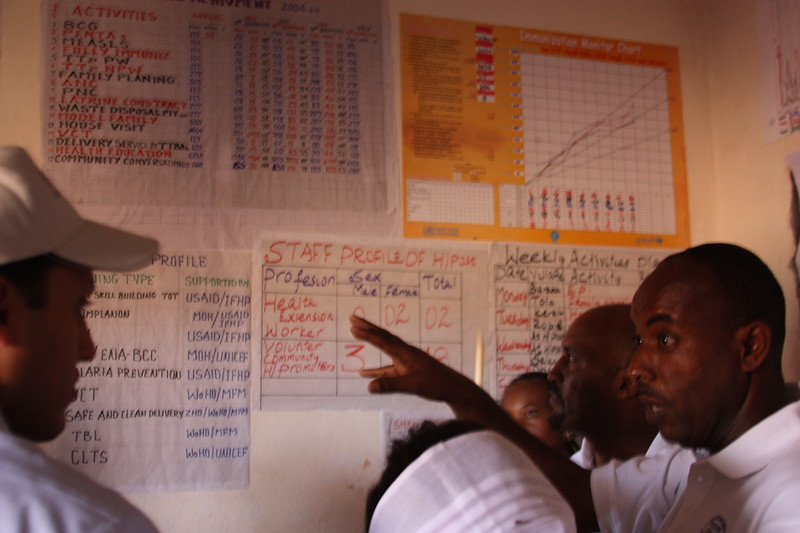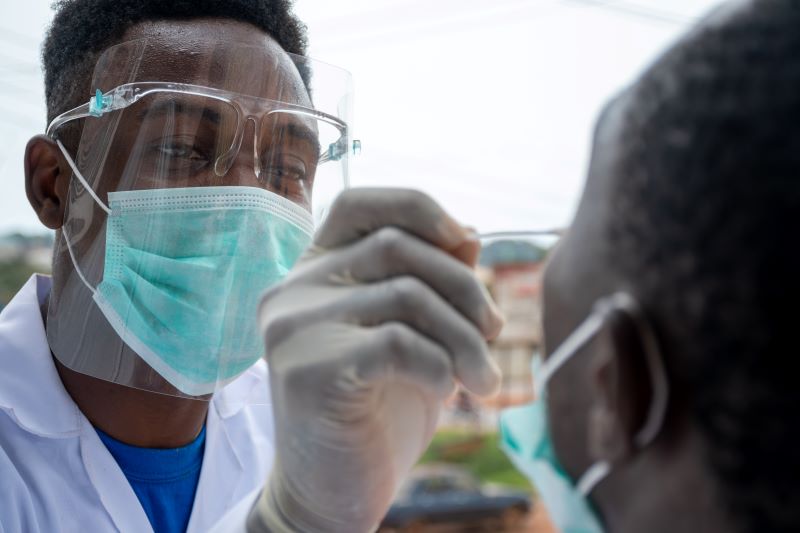Recommended

Blog Post

Blog Post
This blog was originally published by Health Policy Watch.
Health systems in Africa are under considerable strain: rapid demographic change, rising non-communicable diseases, and emerging and re-emerging threats such as COVID-19 and Ebola are increasing demands on limited health services. Africa, however, faces a challenging period in health financing to meet these increasing needs. Health spending in most countries remains far short of what is needed to achieve universal health coverage, and in several countries high debt service has outpaced domestic spending on health and education. There is no indication from donors that development assistance for health will increase to meet these needs, which means that domestic financing will have to close these critical gaps.
These challenges need an integrated national, regional, and global response. Yet, the global development and health financing architecture has, historically, excluded Africa’s voice from important decisions. G20 countries have begun to collectively shape the post-COVID health financing agenda. The group has created a Joint Health and Finance Task Force, and launched the G20 High Level Independent Panel on the best way to finance pandemic preparedness going forward. The African Union’s (AU) admission to the G20 therefore provides an opportunity for Africa to be recognized as a true strategic partner in development; for the continent to make critical inputs to decisions on its development, including health financing reforms; and has the potential to reinvigorate Africa’s resolve to reform domestic issues that hold back the potential for sustainable domestic financing of health. But questions remain about what kind of opportunity this presents: would the G20 membership provide true co-ownership? Would it present equal partnership to engage in meaningful and respectful partnership that would bring true and lasting change to Africa’s development?
An opportunity for Africa’s voice to be heard and acted upon
Historically, Africa has often been excluded from discussions and decisions that impact development and health on the continent. Two recent initiatives with little room for Africa’s voice and participation include the design of COVAX and the design and operation of the Pandemic Fund. A recent evaluation of the COVAX facility showed that the design of this important initiative had insufficient inputs from beneficiary countries, including those in Africa. Yet, this facility was intended to make substantial inputs into how the COVID-19 financing and response was implemented in Africa. The evaluation noted “The original design process was driven by a small subset of stakeholders, notably donors and industry of the Global North, without the meaningful engagement of beneficiary countries” Similarly, the Pandemic Fund—a creation of the G20, sought to have game-changing impacts on the financing of pandemic preparedness and response globally. Yet, the Africa Centers for Disease Control and Prevention, (Africa CDC), Africa’s foremost continental health agency with the mandate to lead public health policy and action in Africa, has yet to be accredited as an implementing partner of the Fund. Instead the Africa CDC is represented as an Observer on the Pandemic Fund’s Governing board, denying it a full seat at the table where crucial decisions are made and preventing it from designing a coordinated regional response. This limits the meaningful participation of the continent in the activities that seek to impact the pandemic preparedness and response landscape in Africa. As a result, in the first allocation of funds by the Pandemic Fund, Africa is the only continent without a funded regional proposal. Going forward, the AU can use its voice within the G20 to ensure that this doesn’t happen again and that it has a seat at the table on all future global health decisions that affect its development: this might include international trade practices, the impacts of climate change, and the growing threat of antimicrobial resistance. Africa can now contribute its voice on these issues at the G20 in unison.
Two key health financing concerns for the G20 to consider: debt relief and reforming global health aid
The G20 membership presents an opportunity for Africa to boldly confront two key global issues that hold it back from achieving its health financing goals. Firstly about 23 African countries are in or at high risk of debt distress. Debt service has clearly outpaced spending on health and education, with consequences on other sectors of the economy. With many of Africa’s creditors in the G20, Africa has an opportunity to make the case for debt relief to assist it with rebuilding its health systems. The G20 has done this before—at the height of the COVID-19 pandemic it suspended $12.9 billion in debt service payments. Secondly, the AU could press the G20 to revisit prior agreements on aid effectiveness to ensure that foreign aid is properly monitored and aligned with national and regional priorities. This is timely as many stakeholders are now calling for substantial reforms of the global health architecture, including major institutions such as the Global Fund and Gavi, to increase country ownership and strengthen country capacity in a sustainable manner, while charting a clear path to ending dependence on these institutions. Africa can therefore use the G20 as a means through which to establish a new compact for donor and domestic financing of health services that puts African governments back in charge of setting health priorities and funding core services, with aid restored to its place as a supplementary health financing stream.
An opportunity for a coordinated African domestic policy response
The G20 membership also has the potential to spur African countries to act on areas where there has been little progress in the past. Despite skepticism about the potential for domestic resource mobilization for health in Africa given the ongoing economic challenges, there are opportunities to boost domestic financing by introducing non-traditional or innovative financing mechanisms. Taxes on alcohol, tobacco, and sugar-sweetened beverages are lower in Africa than in all other regions. By “soft- earmarking” these funds for health, they can mobilize popular support, raise finance, and combat the growing burden of non-communicable diseases. In addition, to mitigate the devastation of the COVID-19 pandemic on economies in Africa, countries should explore other forms of raising (for example through airline levies, import and other duties) and channel domestic resources to strengthen national and regional health systems and public health functions. Furthermore, the time is right for African countries to strengthen their public financial management systems and introduce the use of evidence-informed priority setting mechanisms to improve efficiency in health system decision making to ensure that resources are channeled to the most effective and cost-effective health interventions.
Concluding reflections
The admission of AU into the G20 is timely and welcome. It presents an opportunity to reflect on Africa’s role in ongoing global development and health financing conversations. It gives Africa a voice and a long-overdue seat at the table of global health financing reforms. It enables Africa to renegotiate debts to spur investment in health systems, to input into reforms of the global health architecture, and to establish a new compact for donor and domestic financing of health services that puts African governments back in charge of setting health priorities. Finally, it gives Africa an opportunity to overhaul its financing systems to appropriately prioritize health in its spending through national budgets. Now is the time to move from agenda to action.
Disclaimer
CGD blog posts reflect the views of the authors, drawing on prior research and experience in their areas of expertise. CGD is a nonpartisan, independent organization and does not take institutional positions.
Image credit for social media/web: Oleksii / Adobe Stock





